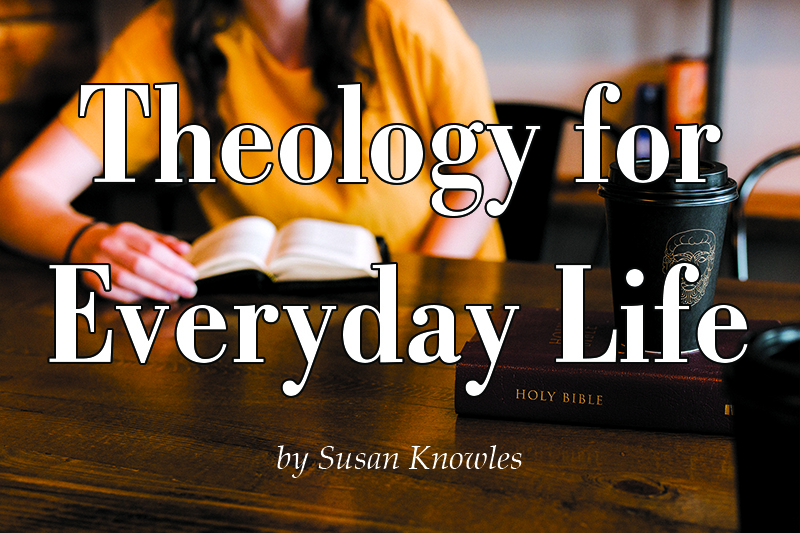Theology for Everyday Life

by Susan Knowles
Two teenagers got into an argument as they were doing dishes at the kitchen sink. Their three-year-old brother rushed into the room, wide-eyed at the way they were treating each other. Still, the teens didn’t notice him until he pleaded in dismay, “Be kind to one another, tenderhearted!”
Disarmed by the little guy, tensions melted away as the older siblings giggled at this bold, sincere, and timely use of God’s Word. Familiar with the verse from Ephesians 4 themselves, they could hear the full passage in their minds: “Be kind to one another, tenderhearted, forgiving one another just as God in Christ forgave you.” In that moment, none of those present doubted that Jesus’ work for us on the cross permeates life, even life’s mundane moments. Theology and everyday life go hand in hand. And God works in His Word even when it comes from the mouth of a little child.
Theology—learning about who God is and how He interacts with our world—is meant to be an ongoing activity in the everyday life of all those who are baptized into Christ. In His explanation of the Parable of the Sower in Luke 8:4-15, Jesus describes how hardness of heart, worldly cares, and persecution—a normal part of life in this fallen world—can prevent, choke, or wither faith. The work of Law and Gospel from God’s Word works toward repentant hearts. God’s Word keeps the priority on eternal treasures even in the face of earthly cares. And it nurtures deep roots that can drink deeply even in times of persecution or suffering. God’s Word is meant to nurture our faith so that the quarrelling siblings who need repentant hearts, adults feeling pressures for worldly priorities at home or work, those suffering among neighbours or family members who intentionally oppose their faith, and other experiences we encounter in daily life would result not in weakening but rather in strengthening faith.
On the way into the Promised Land, the Israelites were directed to ensure that the hearts of God’s people were regularly being nourished with God’s Word, so that fruitful theological conversations and diligent instruction would continually be taking place. Deuteronomy 6: 6-7 instructs: “And these words that I command you today shall be on your heart. You shall teach them diligently to your children, and shall talk of them when you sit in your house, and when you walk by the way, and when you lie down, and when you rise.”
In other words, everyday life was to be intentionally intertwined with the Word of God. Theological conversations and instruction were to be a normal part of life. Martin Luther wrote the Small Catechism to equip families to do just that. It was intended as a resource so that theology would be woven into the daily routines of life once again, including prayers for use throughout the day and a reminder of the duties of home and work, in addition to the basics for instruction in the Christian faith.
Weekday schools were also a top priority, but in a very new way. Schools were to be provided for the first time for all those who had the status of baptized Christian. Low or high social status, boys or girls, all baptized Christians were to be equipped with instruction so that theological conversations would once again be a normal part of the Christian life.
Each generation experiences different limitations and opportunities, and their approach to theological conversations and instruction must be tailored to the life God gives. What does it look like to have God’s words on our hearts today? What does it look like to teach our children diligently, and how can we be prepared to do that? How can we talk to people in our daily lives about how the good news of Jesus is relevant to the moments when we are sitting in our houses, walking by the way, lying down and rising, and doing the dishes?
How can we talk to people in our daily lives about how the good news of Jesus is relevant to the moments when we are sitting in our houses, walking by the way, lying down and rising, and doing the dishes?
The animated little three-year-old in our story had been interacting with simple concepts of Law and Gospel in a weekday class for ages three to five on peacemaking at his Lutheran church. The verse he recited was one of the memory verses for that class. Having this Word of God already in his heart prepared him to recognize that theology—the things he had learned about God and His work—were relevant to a situation in his daily life.
Though by trade my dad was a mechanical engineer, my childhood is filled with memories of him surprising me by finding theology everywhere. He took good theological books to work to read on his breaks. I remember him taking classes the seminary offered at a local congregation. He worked hard to equip himself for teaching Sunday School and for equipping other Sunday School teachers. He took our family to regional workshops and conferences. His study of theology enriched my life in more ways than I can count, and set my expectations of the everyday life of a baptized child of God.
As I grew into adulthood, I also craved anything that would help me grow in my understanding of God and His activity in this world as I served in my vocations at home and work. I loved learning opportunities at conferences and studied on my own as best I could. I pursued training in biblical reconciliation with Ambassadors of Reconciliation. I was amazed at how that training sent me back to studying God’s Word and made me crave a better understanding of the use of Law and Gospel for the sake of my own teaching and parenting. And the chance to audit a seminary class on Lutheran Spirituality years ago equipped me in ways that are still a regular part of my life today. I have had countless conversations with neighbors along the way about things I learned in that class.
Not long after auditing that class, God brought some neighbours into our lives. One day, after just a few months of getting to know one another while our kids played together, our neighbours’ children came rushing to our house, just as an ambulance came rushing to theirs. Their father had suddenly passed away, and over the next days, weeks, and months God used our family to comfort and be present with theirs. Theology and life were intertwined, and we experienced both gratefulness for how God was using us and an aching desire to be better prepared. The struggles of real life teach us to crave theological conversations and instruction not just for ourselves, but also for the benefit of our neighbours.
The struggles of real life teach us to crave theological conversations and instruction not just for ourselves, but also for the benefit of our neighbours.
I’m not sure if anyone was as surprised as I was when I enrolled in the Master of Theological Studies (MTS) program at Concordia Lutheran Theological Seminary (CLTS) in St. Catharines, Ontario. I joked with people that I accidentally started a master’s program. The fact that I could take classes online rather than commuting made it possible. I would have learned a lot by auditing a few classes as I originally intended, but taking on the full requirements of the classes pushed me to engage more deeply in theology. I already had my hands full with children and teaching, but it was amazing how every class I took eventually had an impact within my daily life at home and work. And I am so grateful for how I have been able to apply what I have learned in the classes that I teach.
It was fascinating to learn about how our liturgy developed and about the history behind biblical texts. Not having attended a Lutheran elementary or high school, the history classes gave me a chance to really experience the timeline of history from a biblical perspective for the first time. The Old Testament and New Testament classes taught me how to use resources for more in-depth study of the Bible than I would have attempted before. I found myself in situations that challenged me to apply my apologetics and evangelism classes in situations that came up in daily life. And the systematics classes led me to applications of theology to life again and again in family and in the workplace. These classes helped me become aware of whole areas of study and sets of resources that I had not been exposed to before.
We have so many opportunities to learn about God and how He interacts with our world to enrich our lives today. Bible studies or other theological classes may be offered at your church. Good theological books are readily available in print and online, often for free. There are many online resources available through our church body at www.lutheranchurchcanada.ca. The YouTube channels of LCC’s seminaries regularly post new video studies; just this past year, CLTS posted a free video series on the “Theology of Spirituality”—a great resource for understanding how theology and life intertwine. And yes, we even have the opportunity to audit or take a seminary class online from your own home.
Whatever the format, we have many opportunities to grow deeper in faith and knowledge, as real-life struggles lead us to crave theological conversations and instruction for our own benefit as well as for our neighbours’.
———————
Susan Knowles has just completed her Master of Theological Studies degree with Concordia Lutheran Theological Seminary (St. Catharines, Ontario).
Banner photo credit: Priscilla Du Preez on Unsplash.



